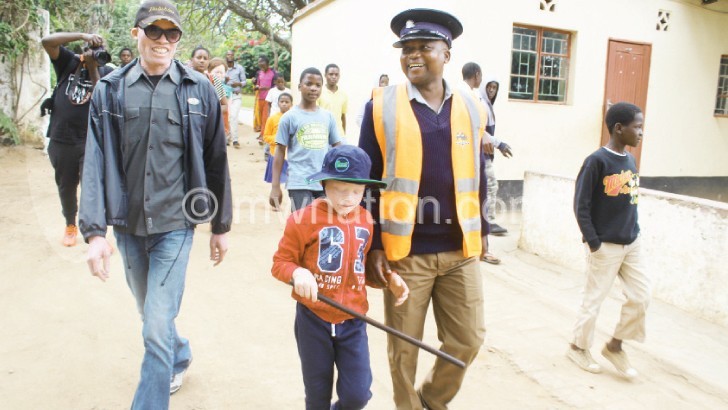When home is not home
A young survivor of attacks on people with albinism dances to shake off the trauma after his twin brother’s head was trafficked to Mozambique, JAMES CHAVULA writes.

June 16, a sunny Saturday in Blantyre. It’s the Day of the African Child. Remember the Soweto Uprising in which South African students died fighting for the right to learn in their language?
Harrison, a passionate dancer, is on stage in a colourful chapel at Good Samaritan Children’s Home on the outskirts of Blantyre City. In February 2016, the 11-year-old boy with albinism, from Machinga, narrowly survived a midnight raid in which his identical twin brother, Harry, was killed.
Association of People with Albinism (Apam) enrolled him at the orphanage eight months after his sibling’s head arrived in a sack from Mozambique.
Magical dance
To the ‘Little Michael Jackson’, dancing is a healing.
In his new sanctuary, he leads a dance troupe. This day, he is wearing a black cowboy hat, red pull-over and a bluish tracksuit. He keeps scratching his forehead probably figuring the first step. His peers fall to the floor at once.
As music blares in the loudspeakers, he stomps and slumps into a moon-walk, bouncing with ease, energy and dexterity. Applauses follow.
Harrison appears safe and unstoppable in his jam. When the music stops, his peers lift him as they bow out. Woooow!
“I dance to be happy,” he says in an interview backstage. “Our teachers teach us dancing and singing. We dance together to forget our problems.”
The boy exudes warmth, often surrounded by smiling friends.
He has found a new home in the centre founded in 2003 by a Christian missionary who was overwhelmed by agonies of poor orphans in rural areas where he preached and built churches.
The centre offers primary education to 150 orphans and vulnerable children, including four highly at-risk pupils with albinism.
In September 2014, Harrison was the first of the four to check in.
“He was nine. He looked scared, lived in isolation, never trusted anyone and couldn’t go out to play with his friends. Every time he saw a new face, he fled into hiding. Now, he has opened up. He is active, friendly and honest. When he is not happy, he says so,” says Thandiwe Chikufenji, the director of the children’s home.
She salutes his schoolmates for supporting him to integrate after the horrifying attack.
“No person should be killed because of the colour of his or her skin,” she says. “Before Harrison came, we had security concerns. However, we had no choice. As a Christian centre, we exist to love and protect children in distress. Our God, who protects orphans, protects these vulnerable children here.”
People with albinism are born without skin pigment, a condition which leaves their skin, hair and eye lids pale or brownish.
They are endangered of being wiped out because they are hunted like game, noted UN special envoy on albinism Ikponwosa Ero when she visited the country.
Apam has recorded about 150 cases, including 25 murders that are still hanging in courts.
The worst hit are children, says Apam president Overstone Kondowe.
Their movement is restricted and rights to education, health and life are constantly under threat.
Home isn’t home
Once, caregivers at Good Samaritan took Harrison to his home in Mpakati Village in Machinga, but he refused to spend a night as he and his mother, Edna Cedric, still remember the night the kidnappers knocked on the door of the grass-thatched mud-brick home.
“My husband went fishing and my children were sleeping beside me. When I woke up to see who was knocking, a man carrying a machete pushed the door in and hacked me,” recounts Cedric.
The attacker grabbed Harry and dragged him out of the bed, she recalls.
“I held on to Harry with one hand while gripping Harrison in the other, but the intruder struck a blow. I fell to the ground. I couldn’t hold on to him any longer. He was gone. I screamed for help. But it was too late. Harrison is still alive because he miraculously sneaked out into the dark,” says Cedric.
Four days later, the police found Harry’s head in Mozambique. Cedric identified it, she says, still struggling to overcome the shock she felt seeing it in a sack.
“When I see Harrison, I remember my deceased son. My surviving son has never been the same. He keeps asking me: ‘Where is my brother?’ What can I tell him? He saw what happened. Sometimes, he screams in his sleep probably thinking the attackers are back.”
The husband, Marizane Kapiri, was interrogated and exonerated by the police.
The step father of the twins has since demolished the isolated house and moved the family to a more populated settlement to avoid another attack.
Senseless and endless
Their suffering exposes devastating physical and psychological wounds suffered by people with albinism.
In 2016, President Peter Mutharika instituted a taskforce to end the “senseless killings”.
He termed the belief that human bones make people rich stupid.
Apam wants drastic reforms in the taskforce to stop continued attacks.
“The taskforce was formed without clear terms of reference and members, except its chairperson Dr Hetherwick Ntaba. It’s a loose group without mandate from Parliament. It only meets on adhoc basis when a person is attacked,” says Kondowe.
Equally reactionary are the police.
“They come when one is killed and not to protect us from being killed. The cases in court keep dragging with no end in sight,” says Apam national coordinator Boniface Massa. n





